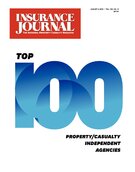As a commercial lines insurance producer in a very competitive industry, I looked for every advantage I could uncover to build my book of business. Like most successful agents, I tried a multitude of different ideas and strategies as I pursued my career. Ultimately, I found the advantage I had been searching for in an unexpected place–outside the office doing what I love: flying planes.
I’m a pilot. I am fascinated by almost everything related to aviation. As a result, I spend considerable time outside of work in this incredibly complex and rewarding avocation. While I knew my investment of time would help me become a better flier, I failed to realize it would also help me become a better insurance agent and agency owner. The skills I learned and honed while flying can apply to anyone–particularly agents looking to grow in their careers.
Consider the following five tips my side gig as a hobby pilot have taught me, and how these skills can fuel agency growth.
Always be open to new ways of learning.
We’ve all heard it gets harder to study and retain information as you get older and further removed from formal education. Whether it’s academically proven or not, I’ve certainly had that experience. We are in a complex, always changing, highly technical business that demands dedication to lifelong learning. Frankly, I chafed at that at times. Continuing education courses seemed difficult to me. The exams in the professional designation programs seemed harder as I got older.
Just as in insurance, mastery of aviation–especially for instrument-rated pilots or commercial pilots–demands considerable knowledge, memorization of facts, and constant study. I learned that, for me, reading text was less useful than listening to it aloud. I realized that I learned best by attending small classes. I found that class discussions helped cement the knowledge and being orally “examined” was much easier for me than taking written tests.
I’m certain others, with different learning styles, have had similar epiphanies. I think the essential benefit for me was determining, long after college was over, how I learned best. Daily study really helped me solidify the material in my head. I took that practice into my insurance education and now make a habit of spending time every day studying something challenging about our industry for a few minutes.
Take the time to plan.
I’m sure you’ve heard of a “flight plan,” which is a formal, highly specific plan pilots file with air traffic controllers. The best pilots do much more than that in preparation for takeoff. I learned to rehearse every aspect of a flight before I stepped foot in the flight deck. I found that if I thought through every phase of a flight in advance, the flight would go more smoothly. My best flights were those where I had a highly specific plan that covered takeoff to touchdown.
Relaying that discipline into my insurance career was a game changer. I began to set aside time before sales calls to think through the upcoming meeting. I learned to role play in my mind what I would do and say. I found that taking the time to develop a “plan B” as I did as a pilot helped me be better prepared to pivot when things went unexpectedly.
In both aviation and my insurance career I learned that advanced planning allowed time to literally slow down, especially in the crucial phases, allowing me to focus and perform at a higher level. In both areas, I found my performance improved.
Keep calm.
I remember going to a training course in Florida where we practiced depressurization emergencies at high altitude. Pilots often have mere seconds to respond when cabin pressure is lost. If they fail in the moment of crisis, lives will be lost. Just days after attending such a course, I had a high-altitude failure, and while it was certainly stirring, I performed just as I had in training.
Pilots must navigate a variety of emergencies in a lifetime of flying. But agency owners have their own crises to navigate. Having prepared and trained in advance for what to do, whether a pressurization failure or a catastrophic weather event, I found it easier to make smart decisions while instilling confidence in those around me that things would turn out OK.
Always be present.
Like many busy people, I am constantly multitasking. In the insurance business, we are always tackling multiple priorities. One moment we’re on the phone navigating a problem; the next, we’re explaining a complex coverage issue to an underwriter; and then, just a few minutes later, we’re extolling the virtues of our agency to a prospective client.
The inevitable challenge of a workday like this is that we can easily become distracted, scattered and less effective. Allowing yourself to be fully present and focused on the conversation or task at hand is difficult and made even tougher today with ever-present phones and computers demanding some of our mental bandwidth.
Allowing yourself to be distracted in the cockpit will literally kill you. A pilot’s self-preservation demands that he or she focus attention on a task and avoid distraction. Pilots are trained to search the sky intently with our eyes, one sector at a time, rather than scan for potential threats. Pilots must learn to be aware of their surroundings without being distracted by them.
Taking this discipline to work in insurance, I found my ability to connect with people improved. I could more clearly analyze coverage issues and offer creative coverage solutions. I found even social conversations with clients and prospects became deeper and more meaningful and impactful. Being fully present–a requirement for pilots–was another potential superpower at work.
Being fully present in the cockpit allows the pilot to really experience the fun of it all. The same applies to the work I love doing. Learning to savor the moment is the biggest payoff of all.
Remember to stay humble.
We all make mistakes. For pilots, those mistakes are often made in public, to be seen by other pilots, passengers, and ever-present air controllers, who are always watching. Even when we perform well, our post-flight debriefs show us how far off the mark we were.
An attitude of humility and recognition of my own flaws is something I found I can’t ignore in the cockpit. Taking that same skill into the workplace has helped me tremendously. I do not take success for granted, understanding that my success is a team endeavor and not something I can achieve by myself. That same humility also helps me cope better with the inevitable failures we all experience.
My aviation hobby has filled my soul and inspired my insurance career. As I fly–now, almost weekly–I continue to learn every day. As I reflect on this experience, I realize just how much integrating those lessons from flying into my career has made both so much more rewarding.
Was this article valuable?
Here are more articles you may enjoy.



 US Appeals Court Rejects Challenge to Trump’s Efforts to Ban DEI
US Appeals Court Rejects Challenge to Trump’s Efforts to Ban DEI  Insurify Starts App With ChatGPT to Allow Consumers to Shop for Insurance
Insurify Starts App With ChatGPT to Allow Consumers to Shop for Insurance  AIG’s Zaffino: Outcomes From AI Use Went From ‘Aspirational’ to ‘Beyond Expectations’
AIG’s Zaffino: Outcomes From AI Use Went From ‘Aspirational’ to ‘Beyond Expectations’  Allstate CEO Wilson Takes on Affordability Issue During Earnings Call
Allstate CEO Wilson Takes on Affordability Issue During Earnings Call 


